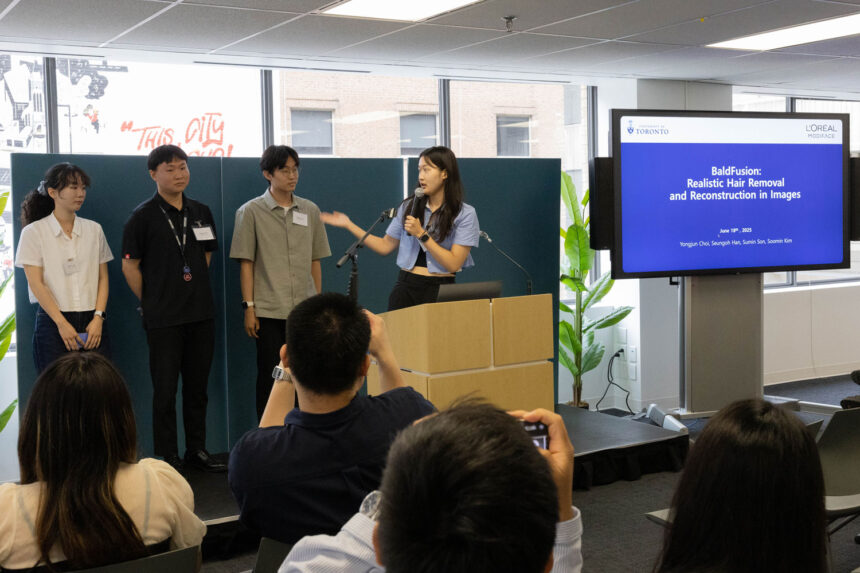I recently spent a fascinating afternoon at the University of Toronto’s engineering campus, where an ambitious new partnership is bringing South Korean graduate students into the heart of Toronto’s artificial intelligence ecosystem. The collaboration, involving 17 talented students from South Korea’s premier research universities, represents a significant deepening of international AI cooperation that could pay dividends for both countries.
“What strikes me most about Toronto’s AI landscape is how accessible the community is here,” said Jinsoo Park, a doctoral candidate from Seoul National University. “In just three weeks, I’ve already connected with researchers I’ve been citing in my papers for years.”
The program, jointly developed by U of T Engineering and the Korea Foundation for Advanced Studies (KFAS), offers these visiting scholars a chance to experience firsthand what makes Toronto’s AI approach distinctive. As someone who’s covered Toronto’s technology evolution for nearly a decade, I’ve watched our city transform into what many now consider North America’s fastest-growing tech hub after San Francisco.
Walking through the Myhal Centre for Engineering Innovation and Entrepreneurship, I couldn’t help but notice the energy as South Korean and Canadian students huddled around workstations, deep in animated discussions about machine learning applications. Professor Deepa Kundur, chair of U of T’s electrical and computer engineering department, explained why this exchange matters.
“These students are experiencing not just technical knowledge but the entire innovation ecosystem,” Kundur told me. “Toronto’s collaborative approach between academia, industry, and government creates a unique environment for AI development.”
The numbers support Toronto’s growing prominence. According to the Vector Institute, AI-related employment in the Toronto region has grown by approximately 85% since 2018, with over 22,000 professionals now working in the field. What’s particularly striking is how Toronto’s approach differs from other global AI hubs.
“In Korea, we have tremendous technical expertise, but Toronto has mastered the integration of AI across diverse sectors,” explained Minjeong Kim, another participating student. “The way AI is being applied to healthcare at hospitals like SickKids and UHN is something we’re eager to learn from.”
During my visit, I observed the students participating in specialized workshops at the Vector Institute, where they engaged with local AI researchers on projects ranging from computer vision to natural language processing. The collaboration extends beyond campus boundaries, with visits planned to Toronto tech companies including startups at the MaRS Discovery District.
As Toronto’s tech reporter, I’ve witnessed countless innovation initiatives, but this one feels different. Rather than a simple knowledge transfer, this program emphasizes building lasting relationships. According to Professor Pina D’Agostino, who leads U of T’s Centre for Innovation Law and Policy, these connections could lead to joint ventures and research partnerships extending far beyond the program’s six-week duration.
“The intellectual property and commercialization frameworks being developed through this collaboration could serve as models for international innovation partnerships,” D’Agostino said during a panel discussion I attended.
For the South Korean participants, Toronto’s multicultural character provides another valuable dimension. “The diversity here isn’t just demographic—it’s reflected in how people approach problems,” noted Hyunsoo Lee from KAIST University. “In our research teams back home, we’re now considering how to incorporate more multidisciplinary perspectives.”
The Toronto AI ecosystem has matured significantly since Geoffrey Hinton’s groundbreaking work at U of T helped spark the deep learning revolution. Today, the city hosts research labs for virtually every major tech company, from Google to Microsoft, alongside homegrown success stories like Cohere and Deep Genomics.
According to the Toronto Region Board of Trade, international collaborations like this one with South Korea could help address one of the ecosystem’s persistent challenges: talent retention. With tech giants constantly recruiting from Toronto’s AI talent pool, partnerships that create bilateral opportunities may help keep innovation flowing in both directions.
“What we’re building isn’t just about current research,” explained Professor Kundur. “It’s about establishing Toronto as a global nexus for AI talent development and deployment.”
As I left campus, I spotted several program participants heading toward Kensington Market, tourist maps in hand but deep in conversation about their research. It struck me that beyond the formal objectives, these cross-cultural connections might ultimately prove just as valuable as the technical knowledge being exchanged.
The program concludes next month with a symposium where participants will present collaborative projects developed during their Toronto immersion. Based on initial results, organizers are already discussing expanding the initiative next year.
In a world where AI development has become increasingly competitive between nations, this Toronto-South Korea collaboration offers a refreshing counterexample of how international cooperation might accelerate innovation for everyone involved.







